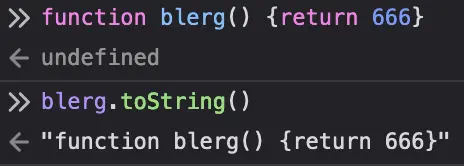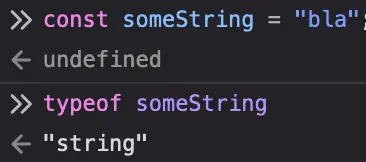Then “b” backwards would have to be “d”
"E".reverse() == "∃"
“:-)”.reverse() == “)-:”
Close enough
The npm package
flip-textis the closest that I know of:const flip = require('flip-text'); const str = "dobo"; const flippedStr = flip(str); console.log(flippedStr); // Output: "qoqo"However, with great libraries like is-thirteen I’m sure JavaScript will some day gain a proper flipping library.
You could implement that on a chat, but I wouldn’t do that on a string
Where’s your sense of adventure?!
Be the operator overload you wish to see in the world
JavaScript taking notes
but
"🙂".reverse() == "🙃""☹️".reverse() == "☹️"You’re no fun
Look closer at the beauty mark, I flipped the emoji
wasn’t it
🙁
.
r
e
v
e
r
s
e
()"
🙂
"
.
r
e
v
e
r
s
e
(
)
=
"
🙃
"
"🐈".concat() = "😼"Also, it should turn an error into an empty but successful call. /s
Calling
reverse()on a function should return its inverseisprime.reverse(True) // outputs 19 billion prime numbers. Checkmate, atheists.It’s a just a joke, but I feel like that actually says something pretty profound about duck typing, and how computable it actually is.
Today I found out that this is valid JS:
const someString = "test string"; console.log(someString.toString());I dint know many OO languages that don’t have a useless
toStringon string types. It mostly seems to be a result of using a generic string-able type that’s implemented to add toString() in a standardised way.Calling
toStringon a string is practically a no-op anyway.I dint know many OO languages that don’t have a useless toString on string types
Okay, fair enough. Guess I never found about it because I never had to do it… JS also allows for
"test string".toString()directly, not sure how it goes in other languages.Java would be
"test string".toString(). C# has"test string".ToString(). Python hasstr("test string")(asstr()is Python’stoStringequivalent). Rust hasString::from("test string").to_string().That’s just from the top of my head. I’m sure there’s more.
Edit: actually, I think Rust’s
to_string()may not be entirely useless, I think it may be used as a consuming placeholder forclone()? Not sure how that would be useful, but it’s not a complete no-op at least.It’s also incredibly useful as a failsafe in a helper method where you need the argument to be a string but someone might pass in something that is sort of a string. Lets you be a little more flexible in how your method gets called
I dint know many OO languages that don’t have a useless toString on string types.
Well, that’s just going to be one of those “it is what it is” things in an OO language if your base class has a
toString()-equivalent. Sure, it’s probably useless for a string, but if everything’s an object and inherits from some top-levelObjectclass with atoString()method, then you’re going to get atoString()method in strings too. You’re going to get atoString()in everything; in JS even functions have atoString()(the output of which depends on the implementation):
In a dynamically typed language, if you know that everything can be turned into a string with
toString()(or the like), then you can just call that method on any value you have and not have to worry about whether it’ll hurl at runtime because eg.Strings don’t have atoStringbecause it’d technically be useless.Same is true for JavaScript’s namesake, Java;
Objecthas atoStringmethod, so everything but primitives (int,long, etc.) must have atoStringmethod (and primitives sort of have one too in a roundabout way).I think JavaScript’s
toStringalso serves another function, namely to have some form of fallback when doing operations on what should be incompatible types.[] + "", for instance; JavaScript will calltoString()to do type conversion when the nearest matching type is aString.

Everything that’s an
Objectis going to either inheritObject.prototype.toString()(mdn) or provide its own implementation.A
Stringis anObject, so it’s going to have atoString()method. It doesn’t inheritObject’s implementation, but provides one that’s sort of a no-op / identity function but not quite.So, the thing is that when you say
const someString = "test string", you’re not actually creating a newStringobject instance and assigning it tosomeString, you’re creating astring(lowercases!) primitive and assigning it tosomeString:
Compare this with creating a
new String("bla"):
In Javascript, primitives don’t actually have any properties or methods, so when you call
someString.toString()(or call any other method or access any property onsomeString), what happens is thatsomeStringis coerced into aStringinstance, and thentoString()is called on that. Essentially it’s like goingnew String(someString).toString().Now, what
String.prototype.toString()(mdn) does is it returns the underlyingstringprimitive and not theStringinstance itself.Why? Fuckin beats me, I honestly can’t remember what the point of this is because I haven’t been elbow-deep in Javascript in years, but regardless this is the logic behind
String’stoString().
[🌽].pop() == 🍿🚴.push() = 🚲🤸
Best I can do is
"\ude41🙂".split("").reverse().join("")returns
"\ude42🙁"








